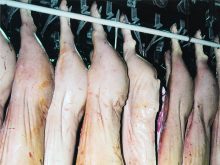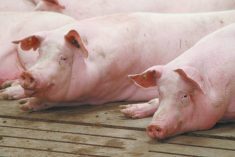New strategy includes aggressively attacking disease outbreaks, intensely monitoring animals and improving operations
Manitoba hog producers are being urged to stamp out porcine epidemic diarrhea virus rather than attempting to live with the piglet-killing plague.
The Manitoba Pork Council has launched a PED elimination campaign for the southeast region, where wave after wave has hit since 2014. When the disease breaks out, it can quickly go from a handful of farms to dozens or more than 100. It kills most baby pigs it infects and damages the health and growth rates of other pigs.
“It’s not sustainable, period, to have that level of PED run through our sector every two years,” said Jenelle Hamblin, MPC’s manager of swine health.
Read Also

New coal mine proposal met with old concerns
A smaller version of the previously rejected Grassy Mountain coal mine project in Crowsnest Pass is back on the table, and the Livingstone Landowners Group continues to voice concerns about the environmental risks.
The council has begun a campaign to get all Manitoba hog producers on-side with a plan to more aggressively attack the disease where it breaks, more intensely monitor barns and animals for early signs of the disease, and improve hog operations so the disease doesn’t happen at all.
In this approach, Manitoba is being bolder than many parts of the U.S. Midwest, to which Manitoba is connected, where hog farmers and the pork industry have tried to manage the disease rather than eliminate it.
MPC doesn’t expect to eradicate PED from Manitoba. The province is too connected to other regions where the disease is widespread. However, if it can reduce major outbreaks by 96 percent, it would consider the disease to be practically eliminated. It wants to reach that goal by 2027.
“This is an outcome-based plan,” said Hamblin.
Another outbreak is expected next year since it tends to come in a two-year cycle. This year there are only five infected locations in the southeast.
MPC’s goal is to see the next major outbreak only hit half as many farms as in the last outbreak, which would mean up to 65 locations could be affected. It also wants each location to suffer shorter outbreaks.
In 2025, it hopes to see an outbreak of only up to 33 locations, then 17 in 2026. After 2027, it wants to see only 10 locations per year with infections.
To get there, MPC believes it needs all-industry co-operation and everybody to follow the plan.
All producers and others in the southeast must commit to following the strategy or the disease will continue to circulate and elimination will be harder.
“It’s something we need to promote and adopt across our sector because there are so many interconnections and intricacies at play here,” said Hamblin.
Getting all-industry co-operation isn’t easy, MPC general manager Cam Dahl admitted. But now that producers have faced multiple waves of PED and the costs associated with battling it, most accept that everybody needs to follow the plan. Other areas being ravaged by PED today are showing what happens when there is weak local solidarity.
“I think in some other jurisdictions, there isn’t the acknowledgement that we’re all in this together,” said Dahl.
“There’s going to need to be a collective response.”
While MPC has a strategy, it is flexible enough for each operation to customize it. It is a series of principles that can be fit to various types of farms.
The basics of the plan include five steps:
- Monitor for the disease.
- Keep it out of the herd.
- Aggressively attack outbreaks.
- Execute a thorough clean-out and six-week production shutdown after an outbreak.
- Continue with “wartime” biosecurity, always.
None of this will be easy. Some producers have been reluctant to undertake the full six-week shutdown during a clean-out because of the massive financial costs.
“I think some of those (production pauses) have been (shortened) in the past,” said Dahl.
However, the long pause is vital to prevent reinfections.
MPC plans a series of one-on-one meetings with production groups in the southeast, including major corporate players, Hutterite colonies and independent producers.
Veterinarians will be closely involved, overseeing implementation of plans on specific operations they serve. The plan was developed by MPC, Manitoba Agriculture and the Chief Veterinary Officer of Manitoba.


















